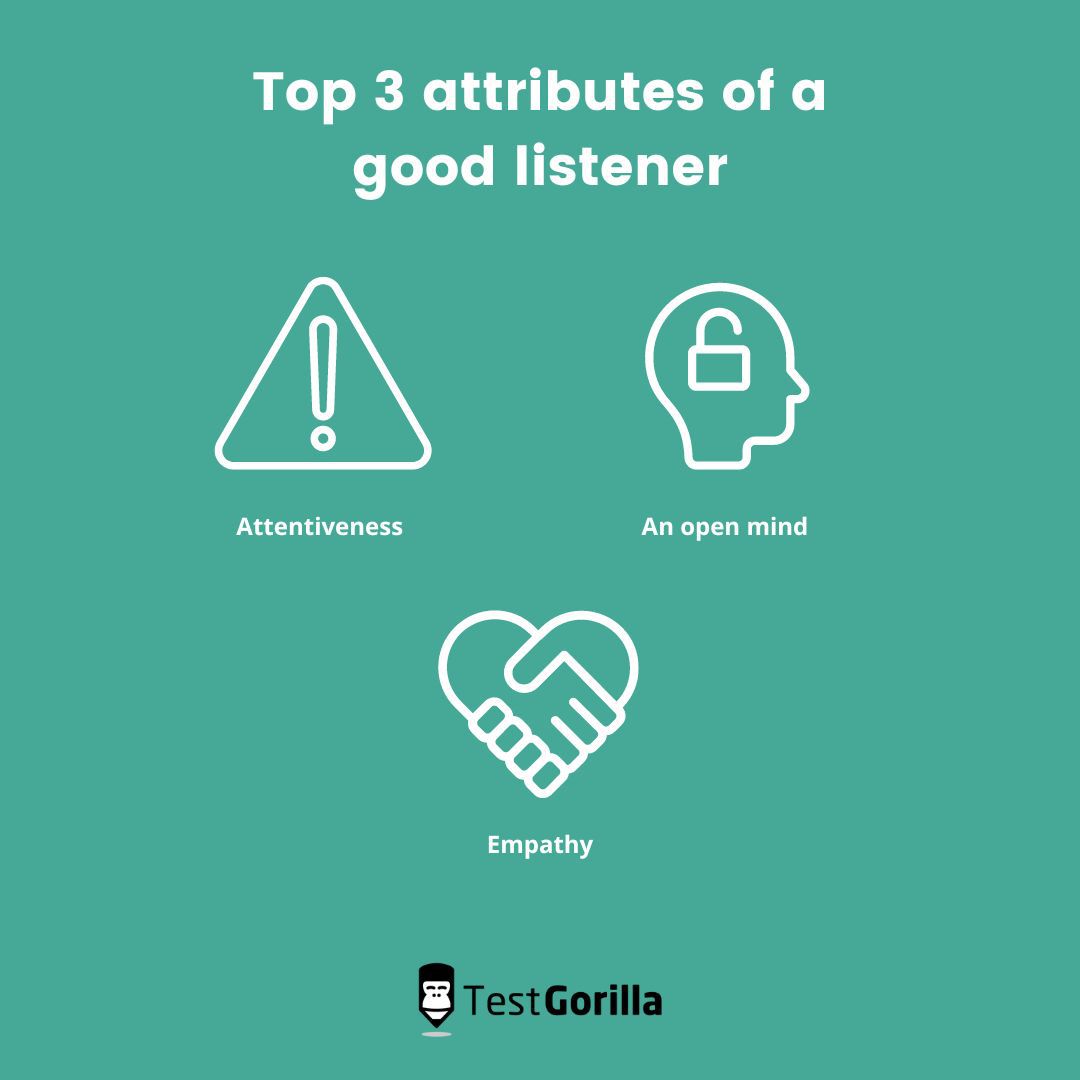The art of listening: How to become an active listener
Everyone should master the art of listening, not least because it’s basic professional etiquette and an essential communication skill. Good listeners aren’t always easy to find, but they’re an invaluable presence in the workplace.
Many people believe that to be a good communicator, you need to focus on being a good speaker. But although eloquence is important, it’s also crucial to be a good listener. After all, conversations are not one-sided, so at least half your focus should be on listening.
There are many factors that affect your ability to listen well, such as intrinsic personality traits and making an effort to be attentive. Read our full article to find out what the art of listening is, what makes a good listener, and the benefits of active listening in the workplace.
What is the art of listening?
It’s a common misconception that listening and hearing mean the same thing. They don’t. In fact, the art of listening goes far beyond simply hearing what another person is saying.
It’s no coincidence that silent and listen are anagrams of each other. Well, maybe it is, but it’s a great coincidence. Silence is the key to practicing the art of listening. Only by taking a step back and not interrupting can you appreciate what another person is saying and give them space to engage in the discussion.
Being silent isn’t always repressive, despite what you might feel. Being silent shows appreciation and consideration for the speaker.
But despite the focus on silence, the art of listening also includes vocal aspects. It’s important to show the other person that you understand what they’ve been saying and respond in an appropriate manner.
You may want to reply with questions. The more specific your questions, the better, since this shows you’ve been paying attention to the small details of what they’ve said.
In essence, the art of listening is about engagement and attention. Showing your conversational counterpart that you’re interested in what they have to say can bring a vast wealth of benefits. What’s more, a good listener has the interpersonal skills to flourish inside and outside of work.
Top 3 attributes of a good listener
So, what is the key to the art of listening? Being a good listener is an invaluable social skill, especially for jobs in which communication plays a major role.
And just as it’s important to have the right tools for vocal communication, it’s crucial to possess the right qualities for listening. Attentive listening begins with self-reflection. Introspecting and adjusting your actions accordingly is a sign of positive growth.
What makes a good listener, then? Below, we’ve outlined some fundamental characteristics of good listeners. Take note of them to improve your interpersonal skills and become a better conversationalist.
Attentiveness
Active listening requires you to remain attentive and interested throughout the conversation. It can be easy to get lost in your own head or drift off every so often, but staying focused on the person and their speech is a crucial aspect of the art of listening.
Being attentive and being interested go hand in hand. Your ability to pay close attention to a person is rooted in your interest in what they are saying. Of course, if what they’re saying isn’t engaging you, it’s easy to drift off. That’s why it’s important to deliberately find interest in their dialogue.
A good listener is curious about a wide range of subjects and will always find a reason to engage in the conversation, avoiding any excuse to remove themselves from the discussion. Finding interest in a conversation is key to being a good listener.
Empathy
The ability to put yourself in others’ shoes is a sign of high emotional intelligence. This skill is particularly important in building long-lasting relationships with colleagues and making a positive impact in the workplace.
Many employees prefer to work for a company that values empathy. In fact, 83% of Gen Z employees would consider leaving their current role to work for a more empathetic organization.
If you can understand a client or customer’s point of view, for instance, you can resolve problems quicker and more effectively. Showing that you can see a situation from multiple points of view also goes a long way when giving your own opinion.
An open mind
Open-mindedness is vital to being a good listener. The art of listening is about immersing yourself in information and opinions you wouldn’t normally be exposed to. Therefore, taking an opportunity to learn from others is hugely beneficial, both personally and professionally.
What’s more, withholding judgment and reducing bias builds trust among colleagues. This, in turn, fosters a more proactive, productive, and engaging work atmosphere. As such, being a good listener is critical to the success of a workplace environment.
The best insights on HR and recruitment, delivered to your inbox.
Biweekly updates. No spam. Unsubscribe any time.
What are the benefits of attentive listening in the workplace?
Being a good listener has many advantages for you and your colleagues in the workplace. Mastering the art of listening can have the following benefits:
Improved workplace relationships. Being a good listener shows colleagues you value them and hear their voices. This can lead to closer, more familiar workplace relationships among employees. And high-quality relationships between co-workers have been shown to have several positive effects, including higher commitment, lower stress levels, and increased perception of social impact.
A friendlier and warmer workplace environment. Positive, productive conversations lead to a greater sense of respect within the workplace and foster closer relationships among colleagues. This reduces toxicity in the workplace and helps minimize office politics.
Easier conflict resolution. By showing empathy and understanding – two aspects of being a good listener – you can resolve conflicts more quickly and respectfully. You can then focus on achieving your business goals without conflict hindering the process.
More open-mindedness, inclusion, and diversity. Good listeners are always open to different ways of thinking. This leads to a more inclusive atmosphere, promoting diversity and inclusion and reducing toxicity within a company.
Better decision-making and judgment. Because of the reduced conflict that comes with good listening, you can solve issues and reach decisions quicker and more efficiently. What’s more, everyone involved in the decision-making process feels heard, and there is more agreement on the final decision.
Which job roles are the art of listening important for?
Being a good listener is essential in leadership roles. Workplace communication is indispensable for managers and team leaders, who require excellent interpersonal skills to foster a successful and welcoming work environment.
Our Active Listening test is a good choice for any job role that requires listening skills. This test uses video-based questions to assess how well candidates can listen and respond to a real-life spoken word scenario, so is a valuable tool to assess listening skills - reflecting, clarifying, validating, and summarizing in response to a speaker.
Hiring managers, executives, managers, directors, and anyone who is responsible for other colleagues should be aware of the benefits of being a good listener. Listening skills are also important for customer-facing roles, such as contact center reps and members of the hospitality industry.
Summary: Why is the art of listening important?
To sum up, the ability to listen well is a critical part of being a standout employee. It doesn’t matter whether you’re an intern or a senior manager – you’ll need good listening skills to form meaningful relationships and perform well. Being a good listener not only drives the success of your career but also the careers of those around you.
Create a more welcoming environment, improve employee well-being, and build long-lasting success all just by listening attentively. You can use our Communication test to screen candidates based on their listening skills. Sign up for our free plan, give our tests a go and you’ll see just how important it is to hire a good listener!
You've scrolled this far
Why not try TestGorilla for free, and see what happens when you put skills first.
















